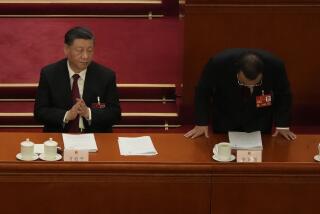Doubts Raised on Longevity of China’s Deng
- Share via
BEIJING — According to his family, the last great wish of ailing Chinese patriarch Deng Xiaoping is to live long enough to see Hong Kong returned to the Chinese motherland.
China is scheduled to regain control of Hong Kong from the British on July 1. But based on reports of his failing health--including one in a Hong Kong newspaper that he suffered a massive brain hemorrhage last week--there are growing doubts that the 92-year-old Deng will make it that long.
Deng--architect of China’s remarkable economic resurgence, a pragmatist who broke the ideological spell of Maoism in the world’s most populous country--last appeared in public during the 1994 Chinese New Year festival in Shanghai. Television reports then showed him looking mentally lost and leaning on the arm of his daughter for support.
Since then, rumors of Deng’s death or impending death have run in cycles here in the politically charged capital. In the latest report, the Reuters news service, quoting sources, said that Chinese President Jiang Zemin and Premier Li Peng had returned early from provincial trips to be at Deng’s bedside at a Beijing military hospital.
“Jiang Zemin and Li Peng cut short their trips and rushed back to Beijing because Deng Xiaoping’s health was deteriorating,” Reuters quoted an unnamed source as saying.
A spokesman for the State Council, the country’s central administrative body, had no comment today on the report. But he also did not deny the report with the standard government line that accompanies reports of Deng’s imminent demise: “Comrade Deng Xiaoping is in normal health for a man of his age.”
Except for the scattered news reports, there are no visible signs that China is about to lose the last of its revolutionary-era leaders.
When Mao Tse-tung died in 1976, state radio broadcast hours of military and patriotic music, signaling that the end was near. On Monday night, China Central Television broadcast its normal menu of appearances by senior leaders.
And a source who spoke with two of Deng’s children Monday said he saw no sign of unusual concern on the part of the family.
In Washington, officials at the State Department said they were closely monitoring the unconfirmed reports of Deng’s turn for the worse.
Deng’s last significant contribution to China’s development came in 1992, when he made his famous nan xun--”southern trip”--to economic development zones in southern China. His comments during that trip urging an acceleration of economic development are credited with catapulting China into a new phase of economic expansion, marked by double-digit annual growth.
For at least the past four years, Chinese internal politics have been characterized by careful positioning by leaders preparing for an orderly succession following Deng’s death.
Leading the pack of possible successors is Jiang, a former mayor of Shanghai who holds the top three positions associated with power in China. In addition to his title as president, Jiang is general secretary of the Communist Party and chairman of the powerful Central Military Commission.
The military commission chairmanship--equivalent to commander in chief of Chinese military forces--is the last formal position held by Deng before he officially retired in 1990.
But formal titles often mean very little in the Chinese power scheme. When Deng made his southern trip in 1992, his only official position was honorary chairman of the All China Bridge Assn. And in periods of political transition, those designated to succeed China’s fallen leaders do not always fare well.
The coming year will be marked by an unusual number of milestone political events in China, including the July hand-over of Hong Kong, which was successfully negotiated by Deng in 1984.
In October, the Communist Party will hold its 15th Party Congress, at which important leadership changes are anticipated. In November, Jiang is expected to make his first state visit to Washington, where he will meet with President Clinton.
But for Deng and his legacy, the most important event is the Hong Kong hand-over in July.
“As for me,” Deng said in his collected works, “I’m willing to live until 1997. Then I will see China assume its sovereignty over Hong Kong with my own eyes.”
More to Read
Sign up for Essential California
The most important California stories and recommendations in your inbox every morning.
You may occasionally receive promotional content from the Los Angeles Times.













